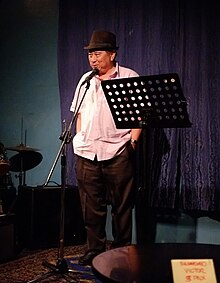fiction.wikisort.org - Writer
Virgilio Senadrin Almario (born March 9, 1944), better known by his pen name Rio Alma, is a Filipino visual artist, author, poet, critic, translator, editor, teacher, and cultural manager.[1] He is a National Artist of the Philippines. He formerly served as the chairman of the Komisyon sa Wikang Filipino (KWF), the government agency mandated to promote and standardize the use of the Filipino language. On January 5, 2017, Almario was also elected as the chairman of the National Commission for Culture and the Arts (NCCA).[2]

Virgilio Almario | |
|---|---|
 | |
| Born | Virgilio Senadrin Almario March 9, 1944 San Miguel, Bulacan, Philippine Commonwealth |
| Pen name | Rio Alma |
| Occupation |
|
| Nationality | Filipino |
| Alma mater | University of the Philippines Diliman University of the East |
| Literary movement | Philippine Modernism |
| Notable awards | Order of National Artists of the Philippines University of the Philippines Centennial Award, Amado V. Hernandez Award, Balagtas Award for Poetry and Essay |
| Spouse | Emelina B. Soriano |
| Children | Asa Victoria, Ani Rosa, Agno Virgilio |
Early life and education
Growing up in Bulacan among peasants, Almario sought his education at the City of Manila and completed his degree in A.B. Political Science at the University of the Philippines Diliman.
His life as a poet started when he took master's units in education at the University of the East where he became associated with Rogelio G. Mangahas and Lamberto E. Antonio. He did not finish the program.[3]
He only took his M.A. in Filipino in 1974 at the University of the Philippines Diliman.
Career
A prolific writer, he spearheaded the second successful modernist movement in Filipino poetry together with Mangahas and Antonio. His earliest pieces of literary criticism were collected in Ang Makata sa Panahon ng Makina (1972), now considered the first book of literary criticism in Filipino. Later, in the years of martial law, he set aside modernism and formalism and took interest in nationalism, politics and activist movement. As a critic, his critical works deal with the issue of national language.
Almario campaigned against the usage and proliferation of siyokoy words in the Filipino language, which according to him were improperly derived from English and Spanish.[4] He also advocated the use of Filipinas as the Philippines official name in both Filipino and English languages.[5]
Aside from being a critic, Almario engaged in translating and editing. He has translated the best contemporary poets of the world. He has also translated for theater production the plays of Nick Joaquin, Bertolt Brecht, Euripides and Maxim Gorki. Other important translations include the famous works of the Philippines' national hero, José Rizal, namely Noli Me Tangere and El filibusterismo. For these two, he was awarded the 1999 award for translation by the Manila Critics Circle.[6][7]
Almario has been a recipient of numerous awards such as several Palanca Awards, two grand prizes from the Cultural Center of the Philippines, the Makata ng Taon of the Komisyon sa Wikang Filipino, the TOYM for literature, and the Southeast Asia Write Award of Bangkok.
He was an instructor at the Lagao Central Elementary School from 1969 to 1972. In 2003, he was appointed Dean of the College of Arts and Letters at the University of the Philippines Diliman. On June 25 of the same year, he was proclaimed National Artist for Literature.[8]
Almario is also the founder and workshop director of the Linangan sa Imahen, Retorika, at Anyo (LIRA), an organization of poets who write in Filipino.[9] Award-winning writers and poets such as Roberto and Rebecca Añonuevo, Romulo Baquiran Jr., Michael Coroza, Jerry Gracio, and Vim Nadera are but some of the products of the LIRA workshop.
He was a founding member of the Gallan sa Arte at Tula (GAT), along with fellow poets Teo Antonio and Mike Bigornia.
Works
Poetry collections
- Palipad-Hangin. (1985)
- Katon Para sa Limang Pandama. (1987)
- Sentimental. (2004)
- Estremelenggoles. (2004)
- Memo Mulang Gimokudan. (2005)
- Dust Devils. (2005)
- Sonetos Postumos, book of poems with translation by Marne Kilates and paintings by National Artist Ang Kiukok. (2006)
- Tatlong Pasyon sa Ating Panahon, poems for children with illustrations by Mark Justiniani, Neil Doloricon, Ferdinand Doctolero. (2006)
- Buwan, Buwang, Bulawan. (2009)
- UP Diksyunaryong Filipino
- Kulo at Kolorum
- Baklang Kolorum
References
- UP Newsletter; 4 April 2008; Volume xxviii Number 03
- "National Artist Virgilio Almario elected as new NCCA Chair". The Manila Bulletin. 6 January 2017. Retrieved 12 January 2017.
- "PressReader.com - Your favorite newspapers and magazines". www.pressreader.com. Retrieved 2019-09-22.
- "Nauna pa sa 'Jejemon' at 'Bekimon:' Ang 'Siyokoy' sa wikang Filipino" [‘Siyokoy’ came first than ‘Jejemon’ and ‘Bekimon’ in the Filipino language]. GMA News (in Filipino). 19 August 2010. Retrieved 26 September 2021.
- Esmael, Paterno II (29 June 2013). "Kill 'Pilipinas,' language commission says". Rappler. Retrieved 26 September 2021.
- "National Book Development Board". nbdb.gov.ph. Archived from the original on 2009-11-18.
- "National Book Development Board". nbdb.gov.ph. Archived from the original on 2009-11-18.
- Biography - RioAlma.com http://rioalma.com/about/ Archived 23 July 2010 at the Wayback Machine retrieved at 27 August 2009, 10:39PM
- "Almario, Virgilio". CulturEd: Philippine Cultural Education Online. Retrieved 2019-09-22.
External links
На других языках
- [en] Virgilio S. Almario
[es] Virgilio Almario
Virgilio Senadre Almario (San Miguel de Bulacán, 9 de marzo de 1944) es un poeta, historiador, editor y artista polifacético filipino, que también realiza, entre otras, labores de profesor y traductor. Es a veces más conocido por su nombre artístico de “Río Alma”. Fue designado Artista Nacional de Filipinas, es director del organismo estatal Komisyon sa Wikang Filipino (KWF) y desde 2017 asimismo director de la National Commission for Culture and the Arts.Другой контент может иметь иную лицензию. Перед использованием материалов сайта WikiSort.org внимательно изучите правила лицензирования конкретных элементов наполнения сайта.
WikiSort.org - проект по пересортировке и дополнению контента Википедии
